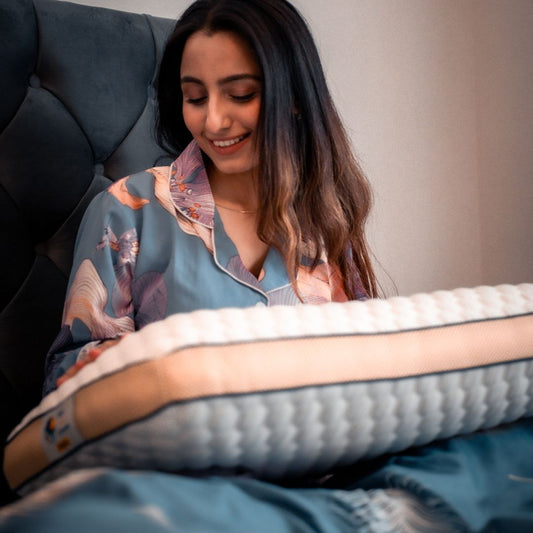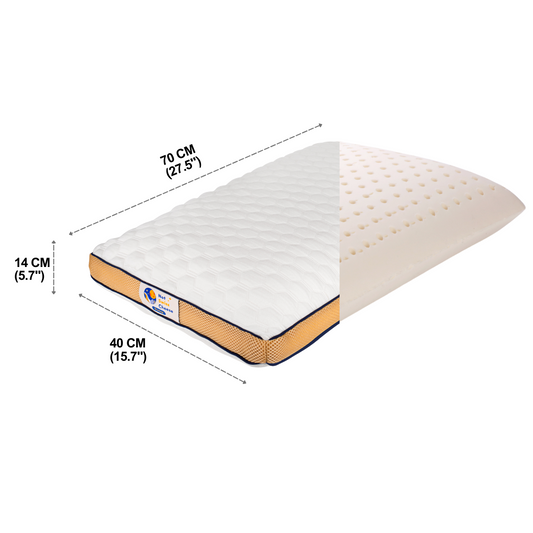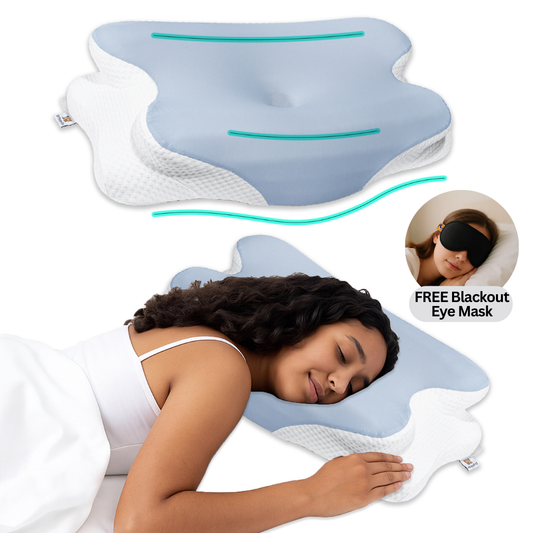- Sleep and Bone Health: Sleeping less than 5 hours a night can lower bone mineral density (BMD), increasing osteoporosis risk - especially in women over 50.
- Healing and Hormones: During sleep, your body repairs bones and produces key hormones like melatonin and growth hormones that support bone strength.
- Circadian Rhythm: Disrupting your internal clock, like working night shifts, can harm bone remodeling and lead to fractures.
- Key Stats: Women with poor sleep are 7.35 times more likely to develop osteoporosis. Bone repair is most active at night.
Quick Tips for Stronger Bones:
- Sleep 7–8 Hours: Stick to a consistent sleep schedule.
- Improve Sleep Environment: Use ergonomic pillows, keep your room cool, dark, and quiet.
- Boost Bone Health: Eat calcium-rich foods, get enough vitamin D, and avoid alcohol or caffeine near bedtime.
- Daily Exercise: Weight-bearing activities like walking or dancing help maintain bone density.
Sleep isn't just about feeling rested - it’s essential for bone health. Take simple steps to improve your sleep and protect your skeleton.
How Your Pillow and Sleep Impact Bone Health
Sleep and Bone Health: The Basic Science
How Bones Rebuild During Sleep
While you sleep, your bones get to work. Osteocytes - specialized bone cells - repair tiny cracks, manage calcium levels, and help heal fractures. Two key players in this process are osteoclasts, which remove minerals when calcium is needed, and osteoblasts, which fix cracks and rebuild bone tissue. Interestingly, bone breakdown and rebuilding are most active at night, making sleep essential for efficient bone repair.
Sleep's Effect on Bone Hormones
Deep sleep is a prime time for your body to produce growth hormones, which play a major role in tissue repair and regeneration. Another key hormone, melatonin, helps by encouraging osteoblast activity and slowing down bone breakdown through specific molecular pathways. These hormonal processes are tightly linked to your internal clock, highlighting the need for regular and consistent sleep patterns.
Daily Body Clock and Bone Health
Your circadian rhythm - your body’s 24-hour internal clock - has a direct impact on bone health. Dr. Elizabeth M. Winter and her team explain:
"It is becoming increasingly clear that bone remodeling is under strict control of the biological clock and that disruption of circadian (ie, 24-hour) rhythms by night shift work is associated with osteoporosis and fractures."
The hypothalamus plays a crucial role in maintaining these rhythms, ensuring that bone remodeling happens on schedule. To keep your body’s clock in sync, experts suggest sticking to a regular sleep routine, eating meals at consistent times, and incorporating daily exercise.
sbb-itb-7fb8e9c
Sleep Loss and Bone Problems
Bone Density Loss
Not getting enough sleep can weaken your bones. Studies reveal that women sleeping less than 5 hours per night have noticeably lower bone mineral density in their whole body, hip, neck, and spine compared to those who sleep 7 hours. This drop in density is comparable to aging an extra year.
Dr. Heather Ochs-Balcom, an associate professor of epidemiology and environmental health, highlights this issue:
"Our study suggests that sleep may negatively impact bone health, adding to the list of the negative health impacts of poor sleep. I hope that it can also serve as a reminder to strive for the recommended seven or more hours of sleep per night for our physical and mental health."
For women over 50, sleeping less than 5 hours a night significantly raises the risk of osteoporosis - by a staggering 7.35 times. This is especially alarming since nearly half of women and 20% of men over 50 already suffer from osteoporotic fractures. On top of this, poor sleep disrupts the bone repair process, making the problem even worse.
Slower Bone Healing
Sleep deprivation doesn’t just lower bone density - it also slows down the healing process. In healthy men, restricting sleep to about 5.6 hours per night for three weeks caused a sharp drop in bone formation markers. Similarly, male soldiers experienced reduced bone formation markers after just one night of poor sleep, with degradation markers increasing after two nights.
Long-term sleep disruptions, like those from over 20 years of rotating night shifts, are linked to a 37% higher risk of hip and wrist fractures in postmenopausal women.
Muscle and Bone Strain
Chronic lack of sleep affects muscles and bones in several ways:
- Lower vitamin D levels, which are essential for muscle and bone health
- Damage to bone microarchitecture
- Increased inflammation and metabolic issues that harm both muscle and bone tissue
This creates a troubling cycle: weaker muscles place more strain on already fragile bones. For night shift workers or anyone with disrupted sleep patterns, this can lead to more falls and fractures over time. Together, these effects weaken the entire musculoskeletal system.
Better Sleep for Stronger Bones
Sleep Habits That Work
Creating the right sleep environment can benefit your bones. A cool, quiet, and dark bedroom sets the stage for better rest. Diwakar Balachandran, M.D., medical director at the MD Anderson Sleep Center, points out:
"Sleep deprivation negatively affects your health and quality of life."
Stick to a consistent sleep schedule, aiming for 7–8 hours each night. Research shows that sleeping too little (under 5 hours) or too much (over 8 hours) can increase the risk of osteoporosis by up to 22%.
To prepare your body for rest, use warm, low-wattage lights and stay away from bright screens at least 30 minutes before bed. This helps maintain melatonin production. You can also boost your melatonin levels naturally by eating foods like alfalfa sprouts and sunflower seeds. Pair these habits with bedding that supports proper alignment for a better night’s sleep.
Natural Latex Pillows and Sleep
Choosing the right pillow can further improve sleep quality and support your spine. Not Swiss Cheese offers natural latex pillows designed to promote skeletal health. Here’s a breakdown of their options:
| Pillow Type | Best For | Key Benefits |
|---|---|---|
| Talalay Latex | New users, side sleepers | Medium-soft support, 99% natural rubber, cooling properties |
| Dunlop Latex | Neck pain, athletes | Medium-firm support, dense structure, spinal alignment |
| Shredded Memory Foam | Position switchers | Adjustable support, customizable height |
For adults, the ideal pillow thickness is between 5–7 inches. Side sleepers benefit from medium-thick pillows, back sleepers from 4–5 inch options, and stomach sleepers from thinner pillows.
Latex pillows are durable, maintaining their shape for 5 years or more. Their natural contouring ability reduces neck strain and provides consistent support throughout the night, helping you sleep more comfortably.
Daily Habits for Better Sleep
Your daily routines play a big role in improving sleep. Exercise, especially weight-bearing activities like walking, jogging, or dancing, can help maintain bone density and should be done at least 2 hours before bedtime.
Avoid heavy meals, caffeine, and alcohol close to bedtime. Instead, focus on a nutrient-rich diet that supports bone health. Keep daytime naps under 30 minutes to avoid disrupting nighttime sleep.
Stress management is also key. Techniques such as mindfulness or deep breathing exercises before bed can help you unwind. With 62% of American adults experiencing sleep issues several nights a week, adopting these habits can set you on the path to better rest and stronger bones.
Conclusion
Key Takeaways
Getting enough sleep is crucial for keeping your bones strong and healthy. Studies show that severe lack of sleep can significantly raise the risk of osteoporosis, especially in older women. Sleep affects everything from bone mineral density (BMD) to how your body processes vitamin D. Chronic sleep deprivation has been linked to lower BMD and reduced levels of 25(OH)D.
Bone cells contain clock genes that play a role in bone remodeling, which influences both BMD and vitamin D metabolism. This highlights how closely sleep and bone health are connected.
What to Do Next
The research makes it clear - small changes can make a big difference. Here’s how to start:
- Improve Your Sleep Environment: Keep your bedroom dark, quiet, and cool. Consider using ergonomic pillows for better spinal support.
-
Be Mindful of Timing: Exercise in the morning to help regulate your body’s internal clock, and limit screen time before bed. As Dr. St-Onge explains:
"Shining a bright light in your face before bedtime is counterproductive".
- Boost Bone Health Through Diet: Pair good sleep habits with a diet rich in calcium and ensure you’re getting enough vitamin D, either from sunlight or supplements.
Both sleeping too little (7 hours or less) and too much (9 hours or more) can negatively impact bone mineral density in adults over 40. Aim for 7–8 hours of quality sleep each night and stick to a consistent bedtime for the best results.








